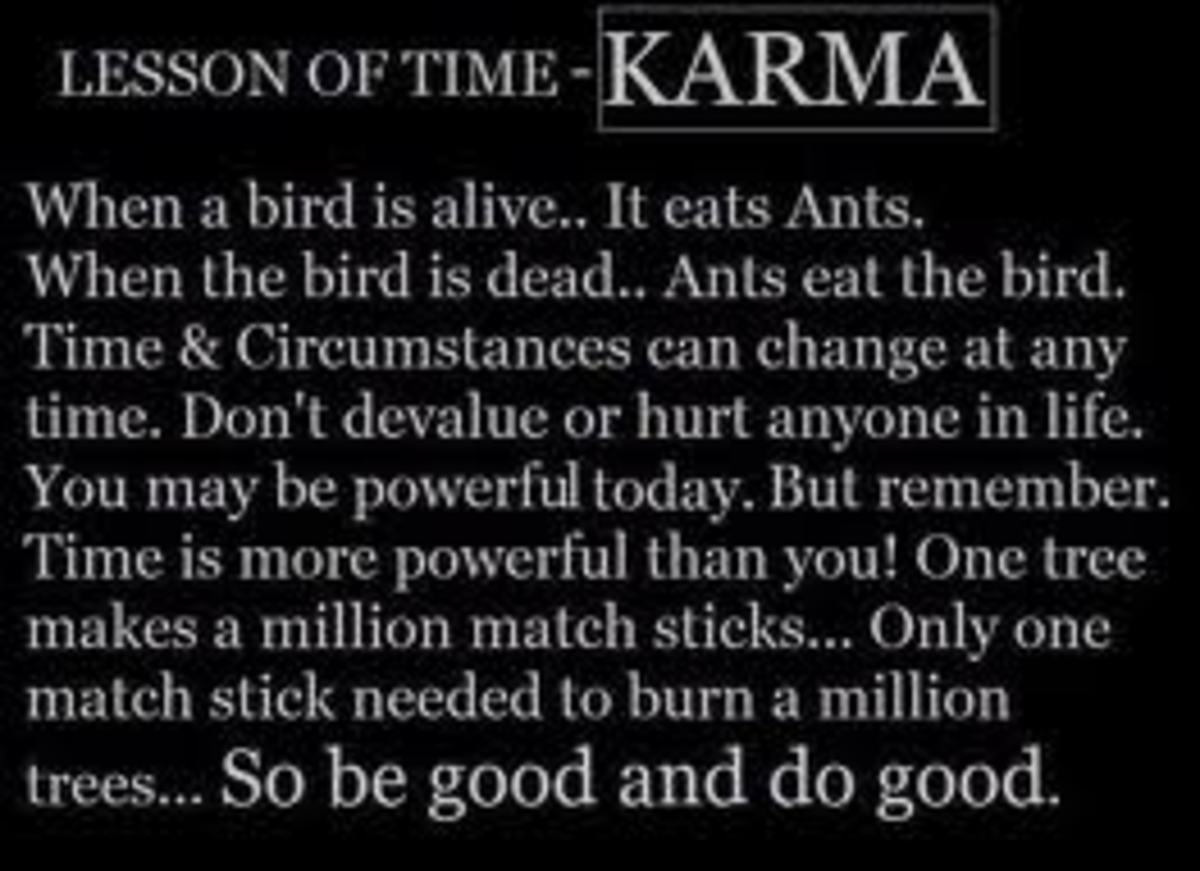The Buddhist Idea of Karma
Karma
In the western world, Karma is tied deeply into two very large misconceptions. "For each action, there is an equal and opposite reaction" is a phrase often associated with Karma, and like most generalizations, it is only partially correct. Another way Karma is often misinterpreted is by the thinking that "If I kill someone, I will be killed." This is a very trivial way to look at Karma. Karma is not "cosmic revenge," or a big tally board in the sky. While thinking of Karma in these terms is not harmful, it is also not correct. What matters most is how being careful of your karma affects your behavior. If you understand karma, and you think about your actions, you behave better. It is simultaneously exactly that simple, but a hundred times more complicated. (We're humans-we can make anything more complicated.)
When one does not possess an intuitive understanding of Karma, or was not raised with the concept, there is room for tragic misinterpretation. For example, there is the story of the monk who refused to save his mother from drowning because he did not want to create more karma. Not recognizing this deliberate inaction as action is foolish: any lawman would have chastised this monk, and maybe even have taken him to prison.
Endorsed Book
So, Killing Bugs is Bad?
Another incorrect view of karma is the idea that your own actions will be repeated against you. For instance, if you crush a bug, you will in turn someday be crushed. If that were true, wouldn't a great many of us die from boulder related incidents?
One of the arguments I often hear against Karma is, in fact, this very scenario with an insect. There are even certain monks who sweep the ground in front of them because they do not want to smash an insect as they walk. People hear about this and think, "Oh, Buddhists don't like to crush bugs. That's stupid." It is a misunderstanding of our philosophy. If you swat a fly while thinking, "A fly! How disgusting! I hate flies!" then you've created bad karma. If, however, one swats a fly while thinking, "Flies spread disease. If I don't kill this fly, it will make me and other people ill," then he has created good karma. While the concepts of "good and bad" karma are actually incorrect concepts, I use them to make the illustration easier to understand.
Really, when we say "Good" or "Bad" karma, we mean something a little deeper. Karma is a Sanskrit word and a form of the word verb "To do." So to translate Karma accurately, we could call it "That which has been done." If you hurt some, you become a person who has caused hurt. You are changed for the worse. If you pay someone a nice compliment, you become a person who has paid out a nice compliment. One part of karma is that your actions resonate, like ripples in a pond. You pay someone a compliment, and 10 years go by and that person remembers you and thinks fondly of you. You kill someone, and police hunt you. 10 years go by, and people still loathe and fear you. Even if you commit the perfect, undetectable murder, you are irrevocably changed. Soldiers who have killed men frequently identify this change in themselves and in others. This is just a tiny aspect of karma, though, and only a limited perspective on it.
Karma cannot be described accurately as "Good" or "Bad" because actions cannot be accurately labeled as "good" or "bad." To Buddhists, good, holy, bad and evil are merely labels applied to actions. Their meaning is entirely determined by the culture of the day. Absolutes are difficult to encounter once you're looking beyond the basic laws of physics. Is murder always "evil?" Is stealing always "bad?"
Yes, and no. You can create complicated karma through your intentions. For instance, if you murder a murderer, and you do so thinking about revenge, then you create a lot of negative karma-he murdered, and then you fed negativity back into the cycle. But if you murder a murderer because you want to protect people, then you've created a complex karmic reaction that changes you in different ways. You have to deal with the fact that you've killed someone, but you do so knowing that you saved lives. This goes even further; if you murder a murderer to stop him from hurting others, and to prevent him from causing himself negative karma, completely prepared to eat the consequences of your actions, the good you have performed so outweighs the bad that there can be no question as to the morality of your action.
Why Bad Things Happen to Good People
Bad things don't happen to good people. Bad things happen to all people. The first noble truth is that life and suffering are interconnected things. You cannot live without pain.
That said, many people will counter the idea of karma with, "If karma existed, bad people wouldn't lead wonderful lives." Such a statement is made without closely examining very many "bad people." Look, for instance, at Hitler. I think most of us can agree he was bad. Hitler created all sorts of negative karma. As a result, he lived amongst lackeys that he feared would betray him. He became angry very easily, and his thoughts seemed to be consumed, constantly, with negative things. He then ended his own life, knowing that if he did not, he would have to face the consequences of his actions.
Take, for another example, Saddam Hussein. He too attempted genocide, he too sparked wars. While we do not know as much about Hussein as we know about Hitler, we do know that Hussein was found hiding in a hole, covered in dirt. At the end of his life, all of the grandeur of being a dictator was stripped from him, and he was executed in a brutal fashion.
When people say that bad people have wonderful lives, they are often identifying "bad people" in a very narrow fashion. They'll identify "Bill Gates" as a bad person because of his shrewd business tactics and his great heaps of money. In reality, these things do not generate Bill Gates very much bad karma at all. The bad karma he creates is very small compared to Hitler, so his suffering is not as apparent. Bill Gates has also donated lots of money to various causes. His karmic reward between the help he causes with his money and the harm he causes with his money are, in all probability, about the same. So he will not have a spirituality that is vastly different from "normal" people. He will not suffer like Hitler or Hussein. He will not have the calm and benignity of Mother Theresa. He is effectively average.
Western thought often dictates that people view karma as a number, or an object that you can have an amount of. This is not really a good way to imagine karma. As one of my best friends told me, that's missing a lot of polarity. Still, if it helps you to think that you have X amount of good karma and X amount of bad karma, there is no harm, so long as it does not lead you to trying to do silly things, like figuring karmic calculations, or trying to determine how much karma is assigned to what type of object. Eventually, you would grow out of such a perception on your own.
Karma is not stuff. Karma is action and reaction. Many, many Buddhists believe that Karma follows people out of their previous lives and into their current lives. This might be true. From a scientific point of view, our bodies contain a tremendous amount of energy in the form of electrons. The electrons delegated to our self-the true "us" beneath the ego-could very well carry karma around with them. Or it could be superstition. It doesn't matter, and if the Buddha had been asked about this, he would have told us that it doesn't matter. The world is filled with suffering, creatures that must eat to live, and "ripples" from other people's karma. Children and puppy dogs can meet awful endings without having generated much karma at all. People who have committed atrocities can live to be a century old. Just because someone has generated very little karma, or nothing but good karma, they are not immune to suffering. We are, all of us, akin to light bulbs. It is not very hard to imagine a new light bulb burning out immediately because it was placed in a bad socket. Why then, is it so hard for westerners to cope with the idea that a baby can die after its first breath?
Does the idea of karma mean that that baby's death is its own fault? Again, this is the sort of question that is not relevant to Buddhist thinking. I am not an enlightened Buddha, so I will attempt to answer the question. If you believe that karma follows you from life to life, then yes, the baby died because of its own bad actions. No other truth would make sense in such a system, because the entire universe would be under the constant influence of karma, both good and bad. If you do not believe that karma can follow someone, then no-it is not the baby's fault. Because, when you step out of your ego and look at the baby, you realize that it was born, it suffered, and then it died. Why must we assign fault to someone over a tragedy borne from the innate suffering that our world causes? If it helps you to think that there is mystic influence-that God has a plan for that child, or that the child was using this existence to shed away negative karma, there is no harm in such a perspective. You might even be right! But Buddhist philosophy is not about being right or wrong in mystical matters. It is about living a fulfilling, wise life.
My perspective on karma may seem like a bleak and pessimistic view, especially if you come from a philosophy where God loves and coddles everyone. But to a Buddhist, it is not depressing at all. To pull oneself out of one's own perspective and look at the entire forest, so to speak, is actually a very cheerful, positive feeling. Yes, the world can be terrible. At the same time, the world is a wondrous place, filled with all sorts of cool things-and these realities live next to each other, side by side. In which world would you rather spend most of your life?










